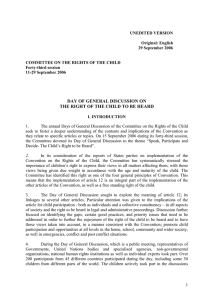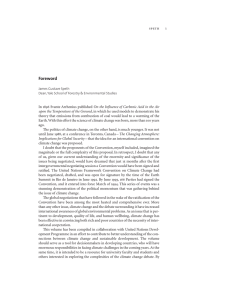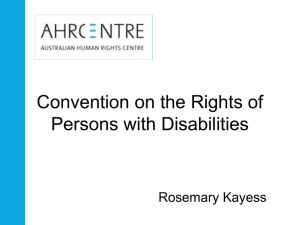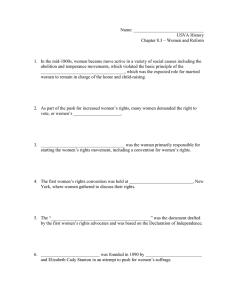UNEDITED VERSION Original: English 29 September 2006
advertisement
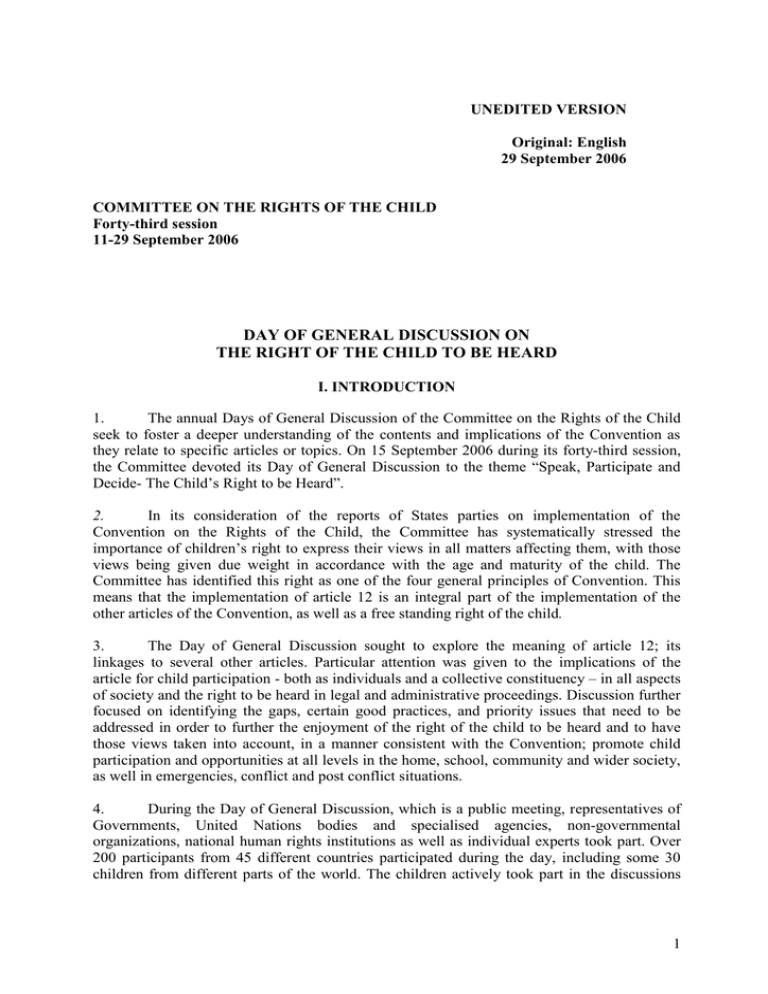
UNEDITED VERSION Original: English 29 September 2006 COMMITTEE ON THE RIGHTS OF THE CHILD Forty-third session 11-29 September 2006 DAY OF GENERAL DISCUSSION ON THE RIGHT OF THE CHILD TO BE HEARD I. INTRODUCTION 1. The annual Days of General Discussion of the Committee on the Rights of the Child seek to foster a deeper understanding of the contents and implications of the Convention as they relate to specific articles or topics. On 15 September 2006 during its forty-third session, the Committee devoted its Day of General Discussion to the theme “Speak, Participate and Decide- The Child’s Right to be Heard”. 2. In its consideration of the reports of States parties on implementation of the Convention on the Rights of the Child, the Committee has systematically stressed the importance of children’s right to express their views in all matters affecting them, with those views being given due weight in accordance with the age and maturity of the child. The Committee has identified this right as one of the four general principles of Convention. This means that the implementation of article 12 is an integral part of the implementation of the other articles of the Convention, as well as a free standing right of the child. 3. The Day of General Discussion sought to explore the meaning of article 12; its linkages to several other articles. Particular attention was given to the implications of the article for child participation - both as individuals and a collective constituency – in all aspects of society and the right to be heard in legal and administrative proceedings. Discussion further focused on identifying the gaps, certain good practices, and priority issues that need to be addressed in order to further the enjoyment of the right of the child to be heard and to have those views taken into account, in a manner consistent with the Convention; promote child participation and opportunities at all levels in the home, school, community and wider society, as well in emergencies, conflict and post conflict situations. 4. During the Day of General Discussion, which is a public meeting, representatives of Governments, United Nations bodies and specialised agencies, non-governmental organizations, national human rights institutions as well as individual experts took part. Over 200 participants from 45 different countries participated during the day, including some 30 children from different parts of the world. The children actively took part in the discussions 1 and throughout the day voiced their priority concerns and provided important contributions with examples of actions and projects relating to the implementation of article 12. 5. In order to facilitate an in depth discussion of these issues, the Committee convened two working groups on the following sub-themes in relation to article 12; Children as active participants in society The child’s right to be heard in judicial and administrative proceedings The recommendations contained herein stem from the concerns and proposals raised during the Day of General Discussion and the over 60 written submissions received prior to the event1. The balance among the recommendations reflects the focus during the discussions of the day and also that of the written contributions, the majority of which highlighted the role child participation at the community level. The Committee however wishes to underline the importance that child participation be encouraged in the home and at school. II. RECOMMENDATIONS2 Preamble The Committee considers that recognising the right of the child to express views and to participate in various activities, according to her/his evolving capacities, is beneficial for the child, for the family, for the community, the school, the State, for democracy. To speak, to participate, to have their views taken into account. These three phases describe the sequence of the enjoyment of the right to participate from a functional point of view. The new and deeper meaning of this right is that it should establish a new social contract. One by which children are fully recognised as rights-holders who are not only entitled to receive protection but also have the right to participate in all matters affecting them, a right which can be considered as the symbol for their recognition as rights holders. This implies, on the long term, changes in political, social, institutional and cultural structures. a.) General 6. The Committee reaffirms the obligation of States parties to implement article 12 which is one of the four general principles of the Convention on the Rights of the Child and should therefore be an integral part of the implementation of the other provisions in the Convention. 7. The Committee recalls the commitment to the right of the child to participate as expressed by States parties in the Special Session of the UN General Assembly on Children in 2002 and the resolution “A World Fit for Children”.3 8. The Committee stresses that appropriate measures need to be undertaken in order to address discrimination of vulnerable or marginalised groups of children such as those affected 1 All written submissions can be consulted at; http://www.crin.org/resources/treaties/discussion2006.asp N.B These recommendations are the outcome of the Day of General Discussion on The Right of the Child to be Heard in 2006, however by no means pretend to form an exhaustive list of recommendations regarding the interpretation of article 12 of the Convention on the Rights of the Child. 3 A/RES/S-27/2 2 2 by poverty or armed conflict, children without parental care, including children in institutions, children with disabilities, refugee and displaced children, street children and children belonging to indigenous and minority groups, in order for all children to enjoy the right enshrined in article 12. 9. In particular, the Committee notes the need to combat certain traditional and cultural attitudes which fail to recognise the right of the child to participate in society. The Committee calls for promotion of a social climate conducive to child participation in order for the right to be realised. 10. The Committee urges States parties to pay special attention to the right of the girl child as sexist stereotypes and patriarchal values undermine and place severe limitations on the enjoyment of the right set forth in article 12. 11. The Committee notes the importance of encouraging opportunities for child participation as a tool to stimulate the evolving capacities of the child. 12. The Committee reaffirms the links between article 12 and article 13, as the right to receive and impart information is an important pre-requisite to realise participation of children. The Committee urges States parties to consider developing child friendly information in relation to all matters affecting children. 13. Recalling its General Comment no. 5 on General Measures of Implementation, the Committee reaffirms that “listening to children should not be seen as an end in itself, but rather as a means by which States make their interactions with children and their interactions on their behalf ever more sensitive to the implementation of children’s rights…article 12 requires consistent and ongoing arrangements. Involvement of and consultation with children must avoid being tokenistic”.4 14. The Committee urges States parties that have made reservations on the application of articles 12, 13, 14, 15 and 17 of the Convention to consider their withdrawal. 15. The Committee recommends that donors, international financial institutions and international organisations ensure that child participation is taken into account in development co-operation. b.) Article 12(1) Children as active participants in society Home 16. The Committee encourages States parties to formulate policies and programmes with a view to support the family and especially those of vulnerable groups. 17. The Committee recommends that States parties to further promote parent education on parenting and disseminate information to parents on the rights enshrined in the Convention and in particular of the right of the child to express his or her views, as they are of benefit to the whole family. 4 CRC/GC/2003/5 para.12 3 18. The Committee encourages parents to support children in order to promote the realisation of child participation at different levels in society. 19. The Committee recognises that a participatory family structure where the child can freely express views provides an important model to encourage child participation in the wider society. Furthermore, it plays a preventive role in the protection against domestic violence and abuse. School 20. The Committee recognises the key role played by the school environment in order to enhance and promote child participation. The Committee reiterates, as previously stated in its General Comment No. 1 on The Aims of Education that “the participation of children in school life, the creation of school communities and student councils, peer education and peer counselling, and the involvement of children in school disciplinary proceedings should be promoted as part of the process of learning and experiencing the realization of rights”.5 21. The Committee urges States parties to ensure that primary education is compulsory and free and of high quality and relevance to the child. Furthermore, states parties should make sure that every child has a place in school, is able to enrol and remains in school without dropping out. 22. The Committee encourages the active consultation of children in the development and evaluation of school curricula, including in the development of methodology, as greater participation is conducive to increasing the involvement of children in the learning process. Child centred education should be provided, taking into account due consideration for vulnerable children. 23. The Committee reminds States parties of their obligation to ensure that human rights education in general, and CRC in particular, is included in the curricula in order to equip children with the fundamental knowledge tools in order to enhance the exercise of their rights. Students informed of their rights can also more effectively combat discrimination, violence and corporal punishment in schools. The Committee encourages States parties to refer to the General Comment no. 8 on the Right of the Child to Protection from Corporal Punishment for further guidance on participatory strategies to eliminate corporal punishment.6 24. The Committee calls on States parties to provide teachers training on participatory teaching methodologies and its benefits and on paying special attention to the needs of vulnerable children, whose difficult situation may lead them to dropping out of schools. The children must enjoy special attention and be given the opportunity to express their views without intimidation. 5 6 CRC/GC/2001/1, para. 9 CRC/C/GC/8 4 Community level 25. The Committee urges States parties to move from an events based approach of the right to participation to systematic inclusion in policy matters in order to ensure that children can express their views and effectively participate in all matters affecting them. The Committee calls on States parties to comply with their obligation to ensure that child participation is taken into account in resource allocation and that mechanisms to facilitate the participation of children be institutionalised as a tool for implementation. 26. The Committee calls for States parties to clearly designate which authority has the key responsibility in the implementation of children’s rights and ensure that this entity establishes direct contact with child and youth led organisations in order to engage with them. 27. The Committee recommends that independent national human rights institutions and or children’s ombudsmen or commissioners ensure that children are given easy access to raise their concerns and that adequate resources are dedicated to involve children in their monitoring of the implementation of children’s rights. 28. The Committee recommends that children and youth be directly included in the planning, design, implementation and evaluation of National Plans of Action which relate to children’s rights, in recognition of their role as core stakeholders in the process. Such an open consultation can ensure that National Plans of Action for the implementation of children’s rights are fully relevant for children. 29. The Committee reminds States parties of the need to provide training on the rights of the child to all public officials who influence government policy and implement programmes which involve children’s issues in order to promote awareness of the rights of the child and the obligation of taking these views into account. 30. The Committee recognises as positive the step taken in numerous countries by the creation of child parliaments at national, regional and local levels, as such initiatives offer valuable insight of the democratic process and establishes links between children and decisions makers. The Committee however urges States parties to establish clear guidelines on how the views presented by children in such forums are taken into account by the formal political process and policy making and ensure that children are provided with adequate response in relation to their proposals. 31. The Committee encourages the direct involvement of children in monitoring the implementation of all rights enshrined in the Convention. The Committee recommends that States parties actively involve children in the periodic review process of the Convention. It also urges children to play an active role in identifying human rights aspects in need of further attention and monitoring the implementation of concluding observations at the national level. In particular, the Committee calls on children to actively engage in local policy issues which relate to budget allocations for example in the areas of education, health, working conditions for youth and violence prevention. 32. The Committee notes the role that can be played by children in reviewing domestic legislation and advocating for legal reform in order to ensure that the principle of participation is adequately reflected in legislation, for example in the Family Code and the Criminal Code. In countries that have yet to adopt a Children’s Code, the active promotion for legislative 5 change by children themselves can play a catalysing role. Furthermore, organised youth participation can make important contributions to promotion of the ratification of international human rights instruments. 33. The Committee recognises and appreciates the important role played by nongovernmental organisations in facilitating the active participation and organisation of children and youth both at the national and international level. Furthermore, the Committee welcomes the increasing number of youth led organisations in various parts of the world. In this context, the Committee reminds States parties of the right to exercise freedom of association as stipulated in article 15 of the Convention. 34. The Committee welcomes the significant contributions by non-governmental organisations in promoting awareness raising in society regarding the right of the child to participate fully in accordance with article 12. The Committee encourages non-governmental organisations to further promote child participation and facilitate international exchanges of experiences and best practices. In particular, the Committee encourages non-governmental organisations, including national alliances on children’s rights, to engage directly with children in the process of parallel reporting under the Convention and also encourages the presence of children during pre-session country briefings with the Committee. 35. The Committee suggests that further attention be given to innovating means of participation in accordance with preferences indicated by children themselves in order to ensure that they feel comfortable in expressing their views. In this context, the Committee recalls article 31 of the Convention which establishes the right of the child to participate freely in cultural life and the arts. The Committee welcomes efforts to enhance child participation through creative expression, including in drama, music and dance. 36. The Committee recognises the essential role played by media in promoting awareness of the right of the child to express their views and urges various forms of media, such as radio and television, to dedicate further resources to including children in the development of programmes and allowing for children to develop and lead media initiatives on their rights. 37. The Committee encourages institutions that conduct research on children’s issues for academic or policy purposes to, when appropriate, ensure that children are actively consulted and are given an opportunity to participate directly in the process. 38. The Committee recommends that States parties take into account children’s participation in the community at different levels and notes that in certain contexts apparent inconsistencies arise, such as when children below the age of 18 are subject to military service yet are not eligible to vote. c.) Article 12(2) The child’s right to be heard in judicial and administrative proceedings 39. The Committee reminds States parties that the right of the child to be heard in judicial and administrative proceedings applies to all relevant settings without limitation, including children separated from their parents, custody and adoption cases, children in conflict with the law, children victims of physical violence, sexual abuse or other violent crimes, asylum seeking and refugee children and children who have been the victims of armed conflict and in emergencies. 6 40. The Committee affirms that all children involved in judicial and administrative proceedings must be informed in a child friendly manner about their right to be heard, modalities of doing so and other aspects of the proceedings. 41. The Committee advises States parties to provide all relevant professional categories involved in judicial and administrative proceedings with mandatory training on the implications of article 12 of the Convention. Judges and other decision makers should, as a rule, explicitly state and explain the outcome of the proceedings, especially if the views of the child could not be accommodated. 42. The Committee urges States parties to examine all existing laws and regulations with a view to ensure that article 12 is adequately integrated in all relevant domestic laws, regulations and administrative instructions. 43. The Committee requests that States parties establish specialised legal aid support systems in order to provide children involved in administrative and judicial proceedings with qualified support and assistance. 44. The Committee notes that with regards to adoption, article 21 (a) of the Convention stipulates that “the persons concerned have given their informed consent” which should be considered in context of the right of the child to express his or her views and have them considered in accordance with the age of maturity of the child. 45. The Committee recalls that in decisions on the separation of children from their parents, “all interested parties shall be given an opportunity to participate in the proceedings and make their views known” in accordance with article 9 (2) of the Convention. 46. The Committee recalls the United Nations Guidelines for the Prevention of Juvenile Delinquency (The Riyadh Guidelines) which state in paragraphs 3, 37 and 50 that “young persons should have an active role and partnership within society and should not be considered as mere objects of socialisation or control…youth organisations should be created or strengthened at the local level and given full participatory status in the management of community affairs…young persons themselves should be involved in the formulation, development and implementation (of plans and programmes)”.7 47. The Committee reaffirms the United Nations Standard Minimum Rules for the Administration of Juvenile Justice (The Beijing Rules) which provide in paragraph 14(2) that “proceedings shall be conducted in an atmosphere of understanding which shall allow the juvenile to participate therein and to express herself or himself freely”.8 48. The Committee reminds States parties that in order to ensure that the views of the children in conflict with the law are duly taken into account, the following must be provided as a minimum in order to ensure their participation in accordance with articles 12 and 40 of the Convention; (a) adequate legal or other appropriate assistance; 7 8 General Assembly resolution 45/112 of 14 December 1990 General Assembly resolution 40/33 of 29 November 1985 7 (b) free access to an interpreter if the child cannot speak or understand the language used; (c) respect for his or her privacy during all stages of the proceedings; (d) recognition that the child has a right to participate freely and cannot be compelled to give testimony. 49. The Committee welcomes the important contribution to the protection of children who have been the victims of sexual abuse or other violent crimes established in the provisions of the UN Guidelines on Justice in Matters Involving Child Victims and Witnesses of Crime, adopted by the United Nations Economic and Social Council in 2005 9 and the Optional Protocol to the Convention on the Rights of the Child on the Sale of Children, Child Prostitution and Child Pornography, in particular article 8. The Committee urges States parties to pay particular attention to these standards and ensure their practical implementation 50. The Committee thus urges Stats parties to ensure that the views, needs and concerns of child victims who have suffered sexual abuse or other violent crimes be presented and considered in proceedings where their personal interests are affected. In addition to the rights outlined above for children in conflict with the law, States parties should adopt and implement rules and proceedings for child victims of physical violence, sexual abuse or other violent crimes ensuring that repetition of testimonies be avoided by the use of video-taped interviews to reduce re-traumatisation, that protective measures, health and psychosocial services be made available and that unnecessary contact with the perpetrator be avoided. The identity of the victim should be maintained confidential and when required, the public and the media should be excluded from the courtroom during the proceedings. 51. The Committee affirms that age should not be a barrier to the child’s right to participate fully in the justice process. In cases when States parties have established a minimum age for the right of the child to be heard, measures should be taken to ensure that the views of the child below the minimum age be considered in accordance with the maturity of the child by specially trained social workers or other professionals. 52. The Committee further notes that age should not be an impediment for the child to access complaints mechanisms within the justice system and administrative proceedings. 53. The Committee recommends that, when applicable, independent national human rights institutions ensure that children can easily access complaints mechanisms and advisory services. 54. The Committee requests that special attention be given to the right of the child to be heard in immigration, asylum and refugee procedures by taking measures to ensure that the rules and practices, including the provision of interpreters, are in full compliance with the requirements elaborated by the Committee on the Rights of the Child in its General Comment No. 6 on the Treatment of Unaccompanied and Separated Children Outside Their Country of Origin (2005), in particular paragraph 25.10 9 10 Economic and Social Council resolution 2005/20 CRC/GC/2005/6 8 55. The Committee urges States parties to ensure that the view of the child and the best interests of the child be given due consideration in all circumstances, including in traditional justice procedures and in post-conflict resolution processes and that all efforts seek to avoid victimisation of the child. d.) Recommendations to be followed up on by the Committee 56. The Committee reaffirms its intention to develop a General Comment on article 12, its importance as a general principle as well as a substantive right and its linkages with other articles of the Convention on the Rights of the Child and in order to provide further guidance on the implementation of the Convention. The General Comment will explore in detail how the right should be implemented consistently in all settings. The Day of General Discussion and its outcome, including the written submissions, form part of this process. 57. The Committee recognises the importance of child participation in the work of the Committee and encourages children and youth representatives to submit information in the context of periodic reviews and stresses in particular their important role in advocating for and monitoring of the implementation of the concluding observations at the national level. 58. The Committee remains committed to exploring means of furthering participation of children in the work of the Committee, and in particular encourages more participation of children during pre-session country briefings with civil society representatives. **** 9
